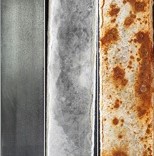Hard water ions aren’t the only culprits to watch for in poor quality diluent water—chlorides and sulfates can be every bit as troublesome.
These metal ions are typically present in higher levels in well, reservoir and or river supplied water. These ions can vary dramatically in some cases on a seasonal basis as water tables may flush out more sediment and contribute to fluctuating levels. What may be marginal water in the winter and early spring months may be terrible water in the summer months.
Chlorides are, of course, very corrosive to metals. When chloride levels are high in diluent water, corrosion of nested/stacked parts is accelerated. Yellow metals like brass, bronze and copper will see the classic green staining and patina and carbide tooling and inserts will be attacked—shortening their work life. Even if chloride levels are “marginal” or of a level not typically of concern—when lubricant solutions dry down—the chloride does not evaporate along with the water—it concentrates at the areas of pooling or contact with other parts. This becomes localized area of corrosion.

Sulfates are typically associated more with staining of metals—particularly yellow metals and zinc-coated steels. Sulfates are also a primary source for sulfate-reducing bacteria that generate unpleasant—”septic” or “rotten egg” odors in manufacturing plants. In addition to these nuisance issues—sulfates can also act synergistically with chlorides to further accelerate corrosion on metal surfaces.
Not only can reverse osmosis and deionization processes eliminate the issues of hard water ions—but also these corrosive ions. Through optimization of stamping lubricant concentration and minimizing the volume delivered and left on parts—overall fluid consumption can be lowered. R.O. treatment of poor quality water (typically the more cost effective and easier of the purification methods) as a diluent can help dramatically improve stamping lubricant performance and impact on subsequent processes like welding, pretreatment and waste treatment. To see how these small process changes can net big gains in productivity—contact your IRMCO representative.


